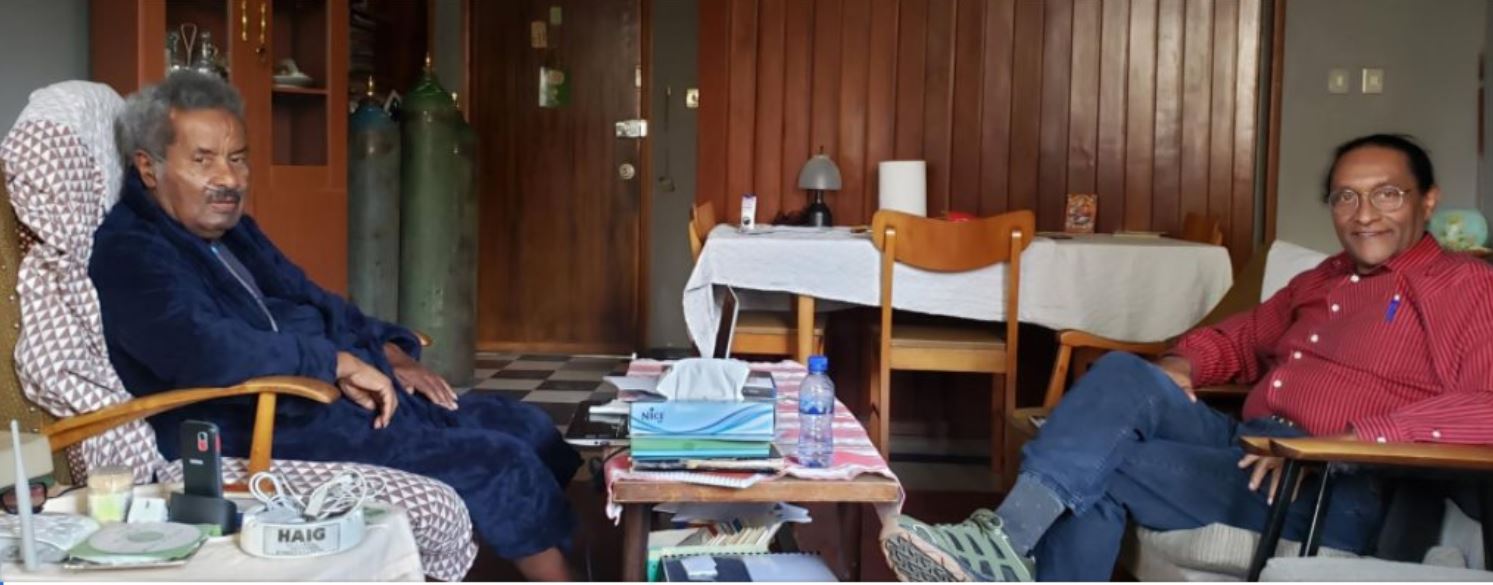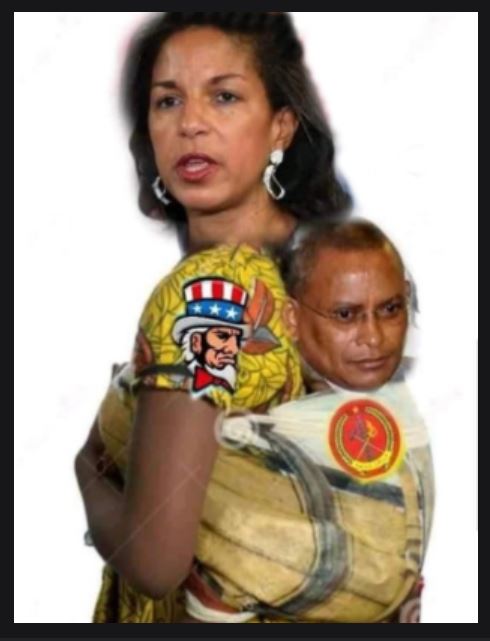Professor Mesfin Woldemariam: Eulogy For a Man Who Spoke Truth to Power
I do not believe this country belongs to a single bully (gulbetegna) [thug]. This land was built by my father and mother, grand-parents and great grandparents. No one can force me into exile. No one can intimidate me and take away my rights as an Ethiopian. I won’t let it happen. Let me make it crystal clear to the woyanes: My life, the place I live and my death will occur right here in Ethiopia.
Let me tell woyane and their minions one undeniable truth: If they commit illegal acts and crimes to victimize me, they should know tomorrow they will face greater persecution and punishments. Those arrogant abusers of powers who believe they could be victorious by murdering should pause and think. One can gain victory through death. One can also triumph in death. Prof. Mesfin Woldemariam, “Where do they want us to go?” April 3, 2015
I offer my deepest condolences to the family of Professor Mesfin Woldemariam. May he Rest Speaking Truth to Power!
I also offer my deepest condolences to the Ethiopian family on the passing of their unrelenting truth-teller son.
I wish I could offer this eulogy in person because Prof. Mesfin singularly inspired me to plunge headlong into Ethiopian human rights advocacy and remain active in the trenches for the past decade and half. But I cannot under the unremitting sanctions of Covid-19.
I say to Covid 19, in the words of John Donne, “Be not proud, Covid 19, though some have called thee/ Mighty and dreadful, for thou art not so.” Nor declare victory in silencing Mesfin Woldemariam.
So, I shall speak of Mesfin Woldemariam from America.
I speak of him today not as his student because I was not fortunate enough to be one.
I speak of him not as a colleague because I was too junior to be one.
I speak of him not as a friend because we lived oceans apart.
I speak of Prof. Mesfin Woldemariam, as a trusted elder, as an inspirer and as the man who shared unique insights with me about Ethiopia and its people.
I speak of Mesfin Woldemariam as the man who personified to me rather late in my life that speaking truth to power is the ultimate mission of the intellectual, especially the public intellectual.
In Western history, Socrates faced trial for speaking truth to power and he did not flinch when he was sentenced to death.
According to Plato, Socrates said, “I know that my plainness of speech makes them hate me, and what is their hatred but a proof that I am speaking the truth?”
Socrates did not carry a bundle of truth with him. He believed his task was to question what others believed as truth.
In Ethiopian history, Mesfin Woldemariam was also a hated man by the powers that be. He too faced numerous trials – in court and out of court – for speaking the plain truth to power. His plainness of speech made him public enemy #1 of the powers that be and a subject of derision and contempt by pseudo-intellectuals and ignoramuses.
Like Socrates, Mesfin Woldemariam questioned what the powers that be, the powerless and the power hungry held out to be the truth.
His truth was the QUESTION.
For he knew the truth can only be discovered through relentless questioning. Truth can be detained for only a fleeting moment and flees and is detained for only a moment with more probing questions.
Prof. Mesfin questioned everyone. King, pope, president, prime ministers, mayor, professor…
He even questioned me (cross-examined?) after I had returned briefly to Ethiopia from the U.S. in later April 1974.
I was introduced to him by my late uncle Prof. Aleme Eshete, the noted Ethiopian historian and human rights advocate.
The two were very good friends and established their human rights organizations about the same time as I understand it. Prof. Mesfin had his “Ethiopian Human Rights Council” and Prof. Aleme the “Ethiopian League for Human Rights.
We met at a coffee shop/bar a stone’s throw from the Ministry of Education.
He asked me about my studies and experiences in America and wanted to know about my impressions of Ethiopia after my return. It was the time of turmoil and the winds of change were in the air. At least on the road as helmeted soldiers drove its tanks in the streets with Jeeps brandishing .50 cal machine guns leading the way.
As I remember it now, he dispensed with the small talk quickly and in his inimitable way launched into “cross-examination”: “How do you think you can use your political science degree to help your country? What are your plans for graduate education? When will you return and help your people who made it possible for you to go to America and get an education?”
Embarrassed and confused, I dodged the questions as best I could because I had not thought about them.
But in the following decades, living in exile in America, I concluded there was no way I could contribute because Ethiopia had become a battleground for military dictators and playground for bush thugs.
Prof. Mesfin, like me and thousands of others, had the same chance to live in exile and do well as an accomplished academic. But he opted to stay put in Ethiopia come hell or high water.
We abandoned Ethiopia and fled to safety, to comfort, to security in America and elsewhere.
He stood his ground in Ethiopia and never, never backed down! Never.
The TPLF woyane tried to get him to back down.
They tried to get rid of him once and for all. Preferably in exile, but if not through more drastic action.
But he was resolute in his defiance to live, fight to his last breath and die in Ethiopia.
In 2015, he wrote (translation):
I am not sure why woyane (TPLF) wants to intimidate me. (Could it be) they want my apartment. In my home, the only two things that may be of value to woyane minions are two paintings by Gebre Christos Desta. Otherwise, I only have books that are of no value to woyanes. Therefore, my persecution at the hands of woyane could only be intended to drive me into exile. Let me make it crystal clear to woyanes: My life, the place I live and my death will occur right here in Ethiopia.
I liked Prof. Mesfin’s critical style. He did not give a damn about praise or condemnation. He spoke his truth come hell or high water.
He was an equal opportunity “lambaster”. He spared no one – king, president, prime minister — in his criticisms. He said what he had to say and let the chips fall where they may.
It is said, “In an age of universal deceit, telling the truth is a revolutionary act.”
For as long as I can remember, it has been an age of universal deceit in Ethiopia as monarchy gave way to military socialist dictatorship and that to ethnic apartheid.
To my knowledge, Mesfin Woldemariam was the only fearless and irrepressible voice in or outside Ethiopia or in the political wilderness of the cowardly silent who shrieked out the truth to king, military dictator or tribal warlord.
That makes Mesfin Woldemariam a revolutionary. A one-man revolutionary army in the service of truth.
I know those who did not like what he has to say and others who did not have the courage or intellect to debate him called him “contrarian”, among other things.
They said, “All he knows is to disagree with everyone. He speaks his mind too much. He criticizes everyone. He never praises anyone. He speaks only ‘his truth.’”
I chuckled whenever I heard such criticisms.
I would tell myself, “Doggone it! That is his job.”
That is his job as a public intellectual.
Public intellectuals connect their scholarship to issues and policies that impact the lives of the voiceless, the powerless and the defenseless. They advocate and work for progressive change while remaining vigilant over those who abuse and misuse their power. They speak their truth. They don’t give a damn what the powers that be or not be think or do.
Prof. Mesfin, the “contrarian” (if indeed he was one) saw his role, in the words of Prof. Edward Said, as “neither a pacifier nor a consensus builder, but someone whose whole being is staked on a critical sense, a sense of being unwilling to accept easy formulas, or ready-made clichés, or the smooth, ever-so-accommodating confirmations of what the powerful or conventional have to say, and what they do. Not just passively unwilling, but actively willing to say so in public.”
When he graciously let me visit him in late January 2020 for several hours, we talked about a lot of things.
I mostly listened to him as he educated me about Ethiopia’s past and present and his hopes for the future.
I asked him how he felt about the change taking place in Ethiopia. He shared some enlightening insights with me.
I asked him his assessment of PM Abiy Ahmed and his administration.
He repeated to me almost verbatim what he had said in his May 2019 interview. He was effusive in his assessment of PM Abiy Ahmed.
In the middle of our conversation, he paused and said (my translation of my recollection): “You must know this. Abiy must take action against the rabble rousers because the people want and expect him to do that. His message of love and forgiveness will take time to penetrate the society and become practice. He must not tolerate those who preach hate and incite violence. Government holds the scales of justice (law) in one hand and sword in the other. Those who sneer at the law must face the sword.”
He recapitulated the essence of what he told me in February in his very last September 7, 2020 interview.
He told me PM Abiy must stay the course he has charted and steer the Ethiopian ship of state to a “destination of unity, equality and prosperity”. He told me, “Abiy is our last chance. There will not be another one.”
He was not telling me any secrets. He has said it all in his public interviews.
I attended a documentary premier on his life in late January 2020. He invited me to attend as his personal guest. I was greatly honored.
I attended the event at the National Theater. It was overflow capacity. It was beautiful.
There he was on screen and in the hall speaking the unvarnished truth. I wish the people who produced the documentary will release it for all Ethiopians to watch.
It was vintage Mesfin Woldemariam. No holds barred. He let them all have it double-barrel!
In November 2015, I published my book review of Prof. Mesfin’s book “Adafne”. He was visiting the U.S. at the time. He told me he had read m review and thanked me for doing it. He wished others would do the same.
The book is a lamentation on the decline and decay of Ethiopian society from the corrosive effects of bad governance, tyrannical rule and moral corruption and a call to action for redemption.
Ironically, the words I wrote in that review (summarized below) capture my appreciation of Prof. Mesfin the Ethiopian scholar and human rights advocate par excellence.
Prof. Mesfin kept on marching on the long walk to freedom stepping to the beat of a different drummer. Himself.
He was a professional dissenter long before he was a university professor. Mesfin Woldemariam, P.D.
The dissenter’s life is hard, onerous and intellectually lonely because truth-tellers have no friends neither among the powers that be or among the powerless who fear being identified with them.
The powers that be wagged their index finger at him, clenched their fist in his face and pushed and shoved him in and out of jail.
That did not stop him. He kept on preaching, teaching, outreaching and impeaching.
I have the highest respect for Prof. Mesfin as a scholar, a public intellectual, defender of Ethiopian history and as a good and honest human being.
He did not play the popular political games of duplicity, double-dealing and dirty tricks.
He said what he meant and meant what he said. If you don’t like what he has to say, you can go straight to that famous place where it never gets cold.
He did not speak with forked tongue like the rest of the political snakes.
Truth-telling makes the truth-teller very unpopular among those who live to lie and lie to live.
Prof. Mesfin was the single bright candle that flickered undimmably for decades in Ethiopia against an enveloping dark sky of intellectual cowardice, political expediency and servile opportunism. The candle that was Mesfin Woldemariam is no more but the light it once shone shall flicker in the hearts and minds of generations of Ethiopians to come.
I should like to think of Prof. Mesfin as Ralph Waldo Emerson’s “Man Thinking”, doing his thing not as a “recluse scholar or valetudinarian.”
Prof. Mesfin was Ethiopia’s “Man Thinking”, the scholar with a heroic mind.
But he was more than that.
He was Ethiopia’s “Man Writing”, “Man Speaking”, “Man Listening,” “Man Inspiring”, “Man Agitating” and “Man Dissenting”.
In his book “Adafne”, Prof. Mesfin, like Emerson’s “world’s eye”, showed us he is “Ethiopia’s eye” preserving the greatness of Ethiopia’s past and passionately communicating that greatness not just to his fellow intellectuals (many of whom would rather gossip to him in private than be seen standing with him in public) but also to a new generation of Ethiopians disconnected from and are ignorant of the greatness of their ancestors.
Prof. Mesfin was our scanning “eye” showing us where Ethiopia and Ethiopians have been, where they are now and where they will or will not be in the future depending on what they choose to do today.
Prof. Mesfin was concerned about Ethiopia’s youth.
“Adafne” is really his memorandum to Ethiopia’s youth.
He warned them to beware and avoid the pitfalls of the present and past generations and redeem Ethiopia from the horrendous fate so many African countries have been condemned to live out by their ineluctable history, collective inaction and lack of visionary leadership.
He placed enormous responsibility on the youth. Only they can save Ethiopia from the fires of tribalism and sectarianism. Only they can save Ethiopia from Ethiopians of the past and present who have destroyed the social fabric, mangled the political structure, perverted the economic system and desecrated the spiritual well-being of the society.
Ethiopia’s youth must save the Ethiopia his generation and mine destroyed.
Prof. Mesfin, once upon a time in America told me, “It is a good life in America. But you will never find a place like Ethiopia. You will find that out one day.”
I am just beginning to find out the wisdom of what he meant.
To me the ultimate measure of a man is his courage to speak truth to power, to the powerless and to those who hunger, thirst and lust for power.
All humans live and die. Prof. Mesfin was blessed with long life. He lived an authentic life. He lived a life speaking truth to power, to the powerless and the power hungry and thirsty.
Dr. Martin Luther King, Jr. wrote, “The ultimate measure of a man is not where he stands in moments of comfort and convenience, but where he stands at times of challenge and controversy. The true neighbor will risk his position, his prestige, and even his life for the welfare of others.”
Prof. Mesfin Woldemariam lived his entire adult life in the storm of challenge and controversy. He risked everything – life, liberty, property, position, prestige, money and fame.
But he lived a free man and died a free man.
That is his legacy to me: Live free and die free!
In his April 2015 commentary, Prof. Mesfin asked, ““Where do they want us to go?”
He proved to them he was going nowhere!
He told them he was going to live free and die free in Ethiopia.
He wrote, “One can gain victory through death. One can also triumph in death.”
By God, Mesfin Woldemariam gained victory in life and triumphed in death!
Farewell, Mesfin Woldemariam, Ethiopia’s “Eye”, Ethiopia’s “Man Writing”, Ethiopia’s “Man Speaking”, Ethiopia’s “Man Listening,” Ethiopia’s “Man Inspiring”, Ethiopia’s “Man Agitating” and
Ethiopia’s “Man Dissenting”!
Thank you for inspiring me.
Thank you for everything!
Rest Speaking Truth to Power!







